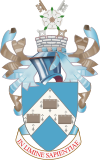Related Research Articles

The University of York is a collegiate research university in York, England. Established in 1963, the university has expanded to more than thirty departments and centres, covering a wide range of subjects.
Oliver Sheldon (1894–1951) was a director of the Rowntree's in York, England. He wrote on principles of public and business administration in the 1920s.
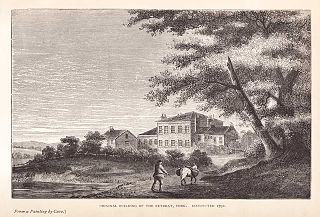
The Retreat, commonly known as the York Retreat, is a place in England for the treatment of people with mental health needs. Located in Lamel Hill in York, it operates as a not for profit charitable organisation.
Sir Edmund "Ted" Happold was a structural engineer and founder of Buro Happold.
Buro Happold Limited is a British professional services firm that provides engineering consultancy, design, planning, project management, and consulting services for buildings, infrastructure, and the environment. It was founded in Bath, Somerset, in 1976 by Sir Edmund Happold when he took up a post at the University of Bath as Professor of Architecture and Engineering Design.
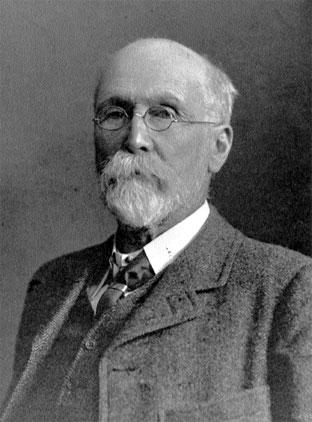
Joseph Rowntree was an English Quaker philanthropist and businessman from York. Rowntree is perhaps best known for being a champion of social reform, partner and friend of Charles Booth, and his time as a chocolatier at family business Rowntree's, one of the most important in Britain. Even as a powerful businessman, he was deeply interested in improving the quality of life of his employees; this led to him becoming a philanthropist, pursuing many charitable causes.

Castle Hill Hospital is an NHS hospital to the west of Cottingham, East Riding of Yorkshire, England, and is run by Hull University Teaching Hospitals NHS Trust.
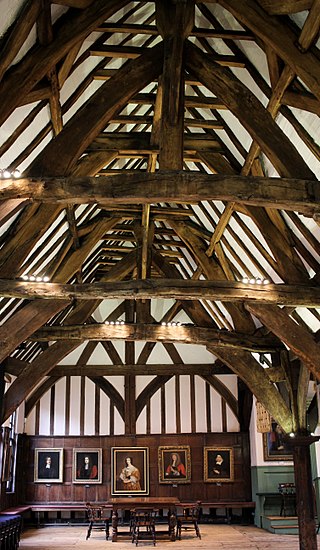
The Merchant Adventurers' Hall is a medieval guildhall in the city of York, England. It is a Grade I listed building and scheduled ancient monument.
Elizabeth Heaps is an English university administrator and academic at the University of York, who has been Pro-Vice-Chancellor there since October 2007, one of the four key positions which support the University's Vice-Chancellor. Her duties include responsibility for Estates and Strategic Projects, including the growth of the campus agreed on its Heslington East site.
Manuscripts and Special Collections is part of Libraries, Research and Learning Resources at the University of Nottingham. It is based at King's Meadow Campus in Nottingham in England. The university has been collecting manuscripts since the early 1930s and now holds approximately 3 million documents, extensive holdings of Special Collections, and the East Midlands Collection of local material, all of which are available for researchers to use in the supervised Wolfson Reading Rooms.
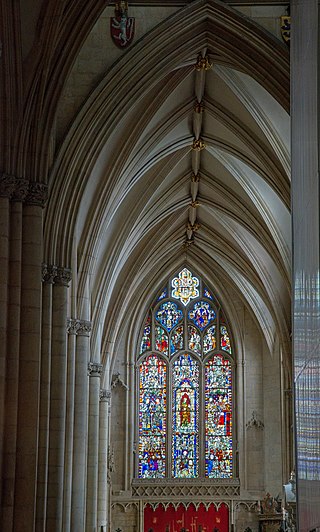
Religion in York can be traced back to the City's foundation in Roman times with evidence of York's first Christian community dating from this period.

Sheffield Archives collects, preserves and lists records relating to Sheffield and South Yorkshire and makes them available for reference and research.
The Joseph Rowntree School is a comprehensive school on Haxby Road in New Earswick in the unitary authority City of York, England.

Arnold Stephenson Rowntree was a Quaker and Liberal MP for York, England.
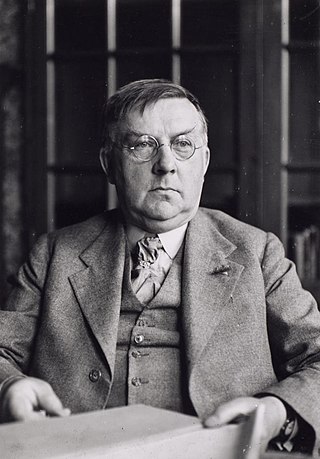
John Bowes Morrell (1873–1963) was an English historian and writer. He was twice Lord Mayor of York, a leading figure in the local movement to establish a university in York, and founder of the York Conservation Trust. The J.B. Morrell Library at the University of York is named after him.

St Anthony's Hall in York, England, is a former medieval guildhall and Grade I listed building. It currently houses Trinity Church York and the Quilt Museum and Gallery. The Hall, located on Peasholme Green, was built between 1446 and 1453 on the site of a chapel of St Anthony for either the Guild of St Martin or the Guild of St Anthony. After the decline of the Guilds, it was used between 1627 and 1705 for various purposes: as an arsenal, a military hospital and a prison. Between 1705 and 1947 it housed the York Bluecoat School, after which it was offered to the York Civic Trust. In 1953, it became the Borthwick Institute for Historical Research, which moved in 2004 to a purpose-built building next to the J. B. Morrell Library on the campus of the University of York. The Quilt Museum and Gallery opened in the Hall in 2008 and closed in 2015.
Originally within the United Kingdom the title of diocesan record office would frequently have referred to a church-owned diocesan registry or chancery. This would have been where the episcopal registers, administrative papers and title deeds were preserved under the general superintendence of the diocesan chancellor.
Lawrence Edmund Rowntree was a British soldier killed during the First World War. He was the only son of John Wilhelm Rowntree of the Quaker Rowntree family and Constance Naish, and grandson of Joseph Rowntree.
Norah Kathleen May Gurney was a British archivist and Director of the Borthwick Institute of Historical Research.
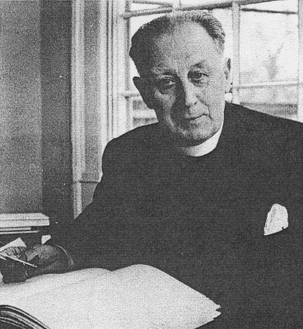
John Stanley Purvis was a British clergyman, archivist, poet, and artist.
References
- 1 2 "University Library and archives:Borthwick Institute – Welcome". Borthwick Institute for Archives. University of York. Archived from the original on 18 April 2009. Retrieved 4 August 2009.
- ↑ "Our origins". Borthwick Institute for Archives. The University of York. Retrieved 7 November 2016.
- ↑ "Lottery secures Archive's Future". The Northern Echo . Newsquest Media Group. 27 July 2002. Retrieved 4 August 2009.
- ↑ "Borthwick Institute". Buro Happold Website. Buro Happold. 2004. Archived from the original on 25 November 2009. Retrieved 28 November 2009.
- 1 2 "Who has headed the Borthwick over the years? – Borthwick Institute for Archives, University of York". www.york.ac.uk. Retrieved 22 December 2022.
- ↑ "Our story". Borthwick Institute. Retrieved 9 March 2022.
- ↑ "Borthwick Institute: What We Hold". 6 October 2020.
